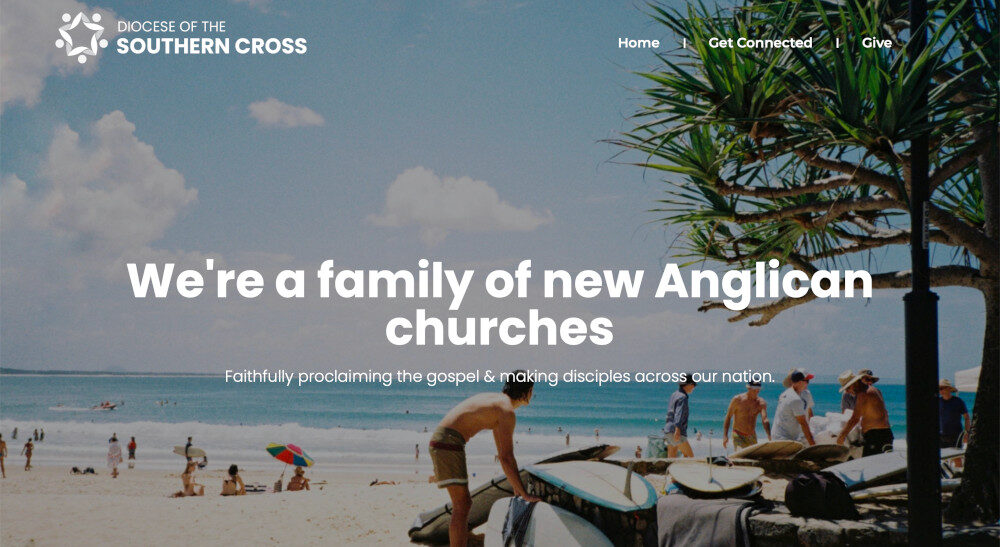The big news coming out of a gathering of hundreds in Canberra for GAFCON (Global Anglicans) is the launch of a new diocese (region) to serve Anglicans in places in Australia where the existing dioceses support blessing same-sex civil marriages.
The Diocese of the Southern Cross led by Glenn Davies, a former Sydney archbishop, has its first church, a group of Anglicans from Beenleigh, in Brisbane forming a new parish. They will be known as Southern Cross Anglican Beenleigh Logan.
This new church and diocese will be seen by progressives as the “crossing of the Rubicon” by some Anglicans – a step that leads to a split in Australian Anglicanism.
Conservatives will respond – the Rubicon was crossed when same-sex marriages were blessed in Wangaratta and authorised in other places.
But conservatives and progressives can probably agree on one thing – the shape of Australian Anglicanism changed forever last night as Gafcon announced the new diocese.
Spare a thought for Peter Palmer whose new church met last Sunday for the first time in the Beenleigh RSL. Palmer has resigned as the minister of Beenleigh in the Southern Queensland diocese. He was unemployed “So I went and I have been driving buses. The bus company down the road. I walked in there the day after I decided I would leave the diocese.” He got offered two other jobs within 24 hours.
“One day about four years ago the archbishop said in my lounge room and said ‘one day we will bless same-sex marriages. I said ‘no I won’t, I can’t. And if you do that I will leave,” he tells Dominic Steele on the Pastor’s Heart vodcast.“You either take all of the Bible or none of the Bible” Palmer says.
“I never once asked them if they were going to come with me or not,” he says of his erstwhile congregation at St Georges Beenleigh, whom he left after the normal three-month notice was cut to a fortnight by the diocese.
Last Sunday he had a nervous moment when at first only ten people showed up at the golf club. But two of his three wardens and two out of three musicians have joined him of the forty “strong biblical people” who turned up. He says he’s had emails and calls “from purple shirts all over the world” after he let gafcon know what he was going to do.
“I never wanted this to be a big public thing – all I wanted to do was just slip away and start a nice congregational fellowship of people who… loved the Lord read the bible and want to evangelise.”
This has been a slow-moving car crash in the Anglican communion. In 2003 same-sex blessings were authorised in Vancouver, Canada, and on the opposite side of North America Gene Robinson, a partnered gay man was elected the Bishop of New Hampshire,
The warning came from conservatives, “this will tear the fabric of the Communion if it continues.”
Progressives in the Anglican Church of Australia lift the banner of “comprehensive Anglicanism – an argument that there should be room at the table for all.
There’s no need right now to rehash the arguments for and against conservative and progressive views on human sexuality, the conservatives wanting to stick to the Bible read plainly, and the progressives saying the Spirit has opened up new truth.
But I would like to examine the claim of “comprehensive Anglicanism.” For it is clear that the conservatives desire – and based on their reading of the Bible wish to create distance between them and any endorsement of same-sex marriage.
But do the progressives practice an open house? Southern Queensland, the official Diocese centred on Brisbane has four Bishops led by Phillip Aspinall. All three assistant Bishops signed the progressive post-Lambeth Inclusive Bishops’ Statement that affirmed the “holiness” of LGBT+ love. It is an all-progressive team.
The obvious rejoinder is that Sydney has an all-evangelical team of bishops. True. They do not claim to include all the strains of Anglican thought. Sydney is not monochrome but it is overwhelmingly evangelical.
In his 2021 speech to the Souther Queensland Synod (church parliament), Phillip Aspinall laid out a plea for “comprehensive Anglicanism.”
“Comprehensive Anglicanism tries to live with paradox and ambiguity by affirming the truth present in various positions which are in tension with one another. Anglicans attempt to live with apparent contradictions and paradoxes in the belief that God’s spirit will lead us more fully into the larger truth in which ultimately they will be resolved.”
Is it fair to ask, where is the evangelical bishop in the diocese, if you are comprehensive?
In other parts of Australia, some dioceses could be described – perhaps = as “comprehensive:” Melbourne certainly and Adelaide if one counts the evangelical Trinity network in the diocese.
But I struggle to see Southern Queensland in the same light.
Just maybe the launch of the Southern Cross diocese will see overlapping jurisdictions, develop in Australia. That is, Anglican churches not belonging to the official dioceses in a particular town or suburb.
This is not exactly new in Anglicanism. There’s a centuries-old custom of “peculiars” and even royal peculiars”, churches and chapels not under the local bishop.
Meanwhile in the US: in the US-based, The Episcopal Church the election of a conservative Bishop Charlie Holt in the diocese of Florida has been challenged.
The Court of review of TEC has now ruled the election invalid due to some covid arrangements for online voting meant a strict quorum was not reached. Progressive groups have been arguing that Holt should not make it through the TEC’s consent process, in which all dioceses vote on whether a bishop’s election is approved.
Florida could signal whether conservative bishops will survive in TEC.


Hi John. There are a few typos in this article (but it’s still a great article!) – the only one that I’ll point out is in the 6th paragraph, where I’m pretty sure you meant ‘resigned’ rather than ‘reigned’! ;😉